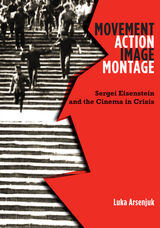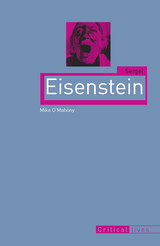
A major new study of Sergei Eisenstein delivers fresh, in-depth analyses of the iconic filmmaker’s body of work
What can we still learn from Sergei Eisenstein? Long valorized as the essential filmmaker of the Russian Revolution and celebrated for his indispensable contributions to cinematic technique, Eisenstein’s relevance to contemporary culture is far from exhausted. In Movement, Action, Image, Montage, Luka Arsenjuk considers the auteur as a filmmaker and a theorist, drawing on philosophers such as Georg Wilhelm Friedrich Hegel and Gilles Deleuze—as well as Eisenstein’s own untranslated texts—to reframe the way we think about the great director and his legacy.
Focusing on Eisenstein’s unique treatment of the foundational concepts of cinema—movement, action, image, and montage—Arsenjuk invests each aspect of the auteur’s art with new significance for the twenty-first century. Eisenstein’s work and thought, he argues, belong as much to the future as the past, and both can offer novel contributions to long-standing cinematic questions and debates.
Movement, Action, Image, Montage brings new elements of Eisenstein’s output into academic consideration, by means ranging from sustained and comprehensive theorization of Eisenstein’s practice as a graphic artist to purposeful engagement with his recently published, unfinished book Method, still unavailable in English translation. This tour de force offers new and significant insights on Eisenstein’s oeuvre—the films, the art, and the theory—and is a landmark work on an essential filmmaker.

Drawing on an extensive archive of Eisenstein’s published and unpublished writings, O’Mahony situates his oeuvre in the social and political context of the first three decades of Communist rule in the Soviet Union. The book analyzes his most influential films—including Battleship Potemkin, October, and Aleksandr Nevskii—as well as his uncompleted film projects, pioneering theories and methods, and copious archive of writings and drawings. O’Mahony examines how Eisenstein’s projects were generated or constrained by his volatile and complex personality, ongoing political events, and the conflict between his beliefs the Stalinist regime and his beliefs as a Bolshevik artist. The arcs of success and defeat in Eisenstein’s career, the book ultimately reveals, are inextricably intertwined with these fraught political and personal circumstances.
An in-depth and thoughtful biographical treatment, Sergei Eisenstein gives us a new, richer understanding of this standard-bearer in modern filmmaking, making this an accessible and essential read for historians, scholars of film history, and movie buffs alike.
READERS
Browse our collection.
PUBLISHERS
See BiblioVault's publisher services.
STUDENT SERVICES
Files for college accessibility offices.
UChicago Accessibility Resources
home | accessibility | search | about | contact us
BiblioVault ® 2001 - 2024
The University of Chicago Press









